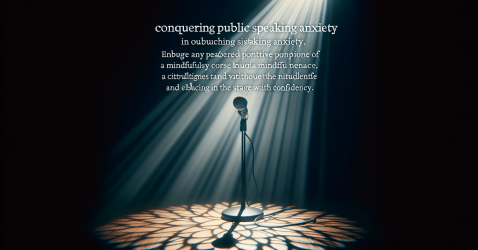How Can Mindfulness And Meditation Help In Reducing Stress?
Imagine a world where you can find peace amidst chaos, where stress melts away like ice on a sunny day, and your mind becomes a sanctuary of calmness and clarity. In this fast-paced world we live in, stress has become a seemingly constant presence in our lives. But fear not, for there is a powerful tool that can help you combat stress and find inner tranquility: mindfulness and meditation. These practices have been celebrated for centuries for their ability to not only calm the mind but also reduce the harmful effects of stress on our physical and mental well-being. So, if you are yearning for a reprieve from the stressors of life, read on to discover how incorporating mindfulness and meditation into your daily routine can help alleviate your stress and cultivate a sense of inner peace.

Understanding Stress
Definition of stress
Stress can be best defined as a physiological and psychological response to a perceived threat, challenge, or demand. It is the body’s natural reaction to both positive and negative situations. When you encounter something that you perceive as stressful, your body releases hormones like cortisol and adrenaline, triggering the fight-or-flight response. While a certain amount of stress can be beneficial for motivation and performance, chronic or excessive stress can have detrimental effects on your overall well-being.
Causes of stress
Stress can be caused by various factors, both external and internal. External stressors include work pressure, financial difficulties, relationship problems, loss of a loved one, or major life changes such as moving or starting a new job. Internal stressors can be self-imposed and arise from negative self-talk, perfectionism, unrealistic expectations, or fear of failure. It’s important to recognize and identify the sources of stress in your life in order to effectively manage and reduce its impact on your physical and mental health.
Effects of stress on physical and mental health
Chronic stress can have a profound impact on both your physical and mental health. It can manifest as physical symptoms such as headaches, muscle tension, digestive issues, and weakened immune system. Stress can also lead to mental health problems including anxiety disorders, depression, irritability, and difficulty sleeping. Prolonged exposure to stress hormones can increase the risk of developing chronic conditions such as heart disease, hypertension, and diabetes. Therefore, it’s crucial to find effective strategies to manage and reduce stress in order to promote overall well-being.
Introduction to Mindfulness
Definition of mindfulness
Mindfulness is a practice that involves paying attention to the present moment with an attitude of openness, curiosity, and non-judgment. It is about intentionally bringing your awareness to the sensations, emotions, and thoughts that arise in your mind and body without getting caught up in them or reacting impulsively. Mindfulness cultivates a sense of acceptance, compassion, and gratitude for whatever is happening in the present moment.
Principles of mindfulness
There are several principles that form the foundation of mindfulness practice. The first principle is non-judgment, which involves observing your thoughts and experiences without labeling them as good or bad. Another principle is non-striving, which encourages you to let go of the need to achieve or get somewhere and simply be present in the moment. Other principles include patience, acceptance, letting go, beginner’s mind, and trust.
Benefits of practicing mindfulness
Practicing mindfulness can bring a multitude of benefits to your life. It helps reduce stress and anxiety by allowing you to become more aware of your thoughts and feelings, and develop a more mindful response to stressors. Mindfulness also improves emotional well-being by enhancing self-compassion, empathy, and resilience. It can improve relationships by fostering better communication and understanding. Additionally, mindfulness has been associated with improved cognitive function, increased focus, and enhanced creativity.
Introduction to Meditation
Definition of meditation
Meditation is a practice that involves training your mind to focus and redirect your thoughts. It typically involves sitting comfortably in a quiet space and using a specific technique, such as focusing on your breath, a word or phrase (mantra), a visual object, or bodily sensations, to achieve a state of mental clarity and calmness. The goal of meditation is to cultivate a calm and peaceful mind, and develop a deeper understanding of yourself and your experiences.
Different types of meditation
There are various types of meditation practices, each with its own unique focus and approach. Some common types of meditation include:
-
Mindfulness meditation: This involves bringing your attention to the present moment and observing your thoughts and sensations without judgment.
-
Loving-kindness meditation: This practice involves directing feelings of love, compassion, and well-wishes towards yourself and others.
-
Transcendental meditation: This technique involves the use of a mantra to transcend thought and reach a state of deep relaxation and heightened awareness.
-
Guided meditation: In this type of meditation, you follow the guidance of a teacher or a recorded audio to help you relax and focus your mind.
Benefits of practicing meditation
Regular meditation practice offers a wide range of benefits for both the mind and body. It can help reduce stress and anxiety, promote emotional well-being, and improve attention and focus. Meditation has also been shown to enhance self-awareness, increase compassion and empathy, and promote a sense of inner calm and balance. Additionally, meditation can improve sleep quality, lower blood pressure, and boost immune function. Overall, incorporating meditation into your daily routine can greatly contribute to your overall well-being and stress reduction.
Scientific Evidence on Mindfulness and Meditation
Research studies on mindfulness and stress reduction
Numerous research studies have demonstrated the efficacy of mindfulness in reducing stress. One study published in the Journal of Consulting and Clinical Psychology found that mindfulness-based stress reduction (MBSR) significantly reduced perceived stress and symptoms of anxiety and depression in a group of individuals experiencing high levels of stress. Another study published in the Journal of Occupational Health Psychology showed that mindfulness training was effective in reducing job stress and improving psychological well-being among workers.
Research studies on meditation and stress reduction
Research on meditation has also shown promising results in reducing stress. A study published in the Journal of Alternative and Complementary Medicine examined the effects of meditation on stress reduction and found that regular meditation practice led to a significant decrease in stress levels and an improvement in overall well-being. Another study published in the Annals of Behavioral Medicine demonstrated that mindfulness-based meditation reduced psychological distress and improved resilience in individuals facing significant life stressors.
Summary of findings
In summary, both mindfulness and meditation have been extensively studied and have shown significant benefits in reducing stress and enhancing overall well-being. Scientific research consistently demonstrates the positive impact of these practices in reducing perceived stress, anxiety, and depression, as well as improving emotional resilience, cognitive function, and physical health. These findings provide strong evidence for the effectiveness of mindfulness and meditation in stress reduction.

Mindfulness-Based Stress Reduction (MBSR)
Overview of MBSR program
Mindfulness-Based Stress Reduction (MBSR) is an evidence-based program developed by Dr. Jon Kabat-Zinn in the late 1970s. It is designed to teach individuals how to use mindfulness meditation and other mindfulness practices to manage stress, pain, and illness. The MBSR program is typically conducted in a group setting over the course of 8-12 weeks and includes weekly classes and a day-long retreat.
Components of MBSR
The MBSR program incorporates various components to facilitate stress reduction and enhance mindfulness skills. These components include:
-
Formal mindfulness meditation: Participants learn various meditation techniques such as body scan meditation, mindful breathing, and loving-kindness meditation.
-
Gentle yoga: Participants engage in gentle stretching and yoga postures to promote physical relaxation and body awareness.
-
Inquiry and group discussions: Participants have the opportunity to reflect on their experiences during meditation practice and explore insights in a supportive group setting.
-
Home practice: Participants are encouraged to establish a regular home meditation practice and integrate mindfulness into their daily lives.
Effectiveness of MBSR in reducing stress
Numerous studies have demonstrated the effectiveness of MBSR in reducing stress and improving overall well-being. Research published in the Journal of the American Medical Association showed that MBSR reduced medical symptoms and improved psychological well-being in individuals with chronic pain and other medical conditions. Another study published in the Journal of Psychosomatic Research found that MBSR significantly reduced stress and burnout in healthcare professionals. MBSR has also been shown to be effective in reducing stress, anxiety, and depression in various other populations, including students, veterans, and individuals with post-traumatic stress disorder (PTSD).
Mindfulness Techniques for Stress Reduction
Breathing exercises
One simple yet effective mindfulness technique for stress reduction is focused breathing. By bringing your attention to your breath and observing each inhalation and exhalation, you can anchor yourself to the present moment and create a sense of calm. Deep breathing exercises, such as diaphragmatic breathing or box breathing, can help activate the body’s relaxation response and reduce stress.
Body scan meditation
Body scan meditation involves systematically bringing your attention to different parts of your body, starting from the top of your head and moving down to your toes. It allows you to cultivate body awareness, release tension, and promote relaxation. During the body scan, notice any areas of tightness or discomfort and gently breathe into those areas, allowing them to soften and relax.
Mindful eating
Mindful eating involves paying full attention to the sensory experience of eating, without distractions or judgments. Take time to savor each bite, notice the flavors, textures, and smells of your food. Eat slowly and mindfully, chewing each bite thoroughly. This practice can help you develop a healthier relationship with food, reduce overeating, and enhance your enjoyment of meals.
Walking meditation
Walking meditation involves bringing mindfulness to the act of walking. Slow down your pace and tune into the sensations of each step, the movement of your body, and the contact of your feet with the ground. Pay attention to your surroundings, the sounds, and the sensations in your body as you walk. Walking meditation can be practiced in a park, garden, or even during your daily commute.
Recognition and acceptance of emotions
Mindfulness encourages the recognition and acceptance of emotions without judgment or resistance. When you feel stressed or overwhelmed, take a moment to tune into your emotions. Observe them with curiosity and compassion, acknowledging that they are temporary experiences. By cultivating this attitude of acceptance, you can reduce the impact of negative emotions and develop emotional resilience.

Benefits of Mindfulness and Meditation in Stress Reduction
Improved self-awareness and self-regulation
Mindfulness and meditation practices enhance self-awareness by allowing you to observe your thoughts, emotions, and physical sensations with clarity and non-judgment. This increased self-awareness enables you to recognize stress triggers and respond to them skillfully, rather than reacting automatically. By developing the ability to regulate your emotions and manage stress effectively, you can improve your overall well-being and reduce the negative impact of stress on your health.
Enhanced resilience and coping mechanisms
Regular mindfulness and meditation practice can strengthen your resilience and coping mechanisms in the face of stress and adversity. By cultivating a present-focused mindset and developing skills to ground yourself in the here and now, you can navigate challenges with greater ease and adaptability. Mindfulness and meditation provide you with the tools to respond to stressful situations with equanimity, patience, and compassion, promoting mental and emotional resilience.
Reduced anxiety and depression
Research has consistently shown that mindfulness and meditation can significantly reduce symptoms of anxiety and depression. By bringing your attention to the present moment and cultivating an attitude of acceptance towards your thoughts and feelings, you can break free from negative thought patterns and decrease rumination. Mindfulness and meditation also promote the activation of the parasympathetic nervous system, triggering the relaxation response and reducing the physiological symptoms of anxiety and depression.
Better sleep quality
Mindfulness and meditation practices can improve the quality of your sleep by calming and quieting the mind. By engaging in relaxation techniques before bedtime, such as deep breathing or a body scan meditation, you can alleviate stress and promote a sense of calmness, making it easier to fall asleep and stay asleep throughout the night. Regular mindfulness practice has been associated with improved sleep duration, sleep quality, and a reduced risk of insomnia.
Improved focus and concentration
The practice of mindfulness and meditation enhances your ability to focus and concentrate. By training your mind to anchor itself to the present moment, you can reduce distraction and improve your ability to stay on task. Mindfulness practices also increase working memory capacity and cognitive flexibility, enabling you to switch between tasks more efficiently. These cognitive benefits contribute to improved productivity, performance, and overall mental clarity.
Incorporating Mindfulness and Meditation into Daily Life
Starting a meditation practice
Starting a meditation practice can be as simple as setting aside a few minutes each day to sit quietly and focus on your breath. Find a quiet and comfortable place where you can sit undisturbed. Start with just a few minutes of meditation and gradually increase the duration as you become more comfortable. You can use guided meditation apps or online resources to support your practice, or join a local meditation group for guidance and support.
Creating a mindful environment
Creating a mindful environment can help cultivate a sense of calm and promote mindfulness throughout your day. Pick a specific area in your home or office where you can practice mindfulness, free from distractions. Decorate the space with calming and meaningful objects, such as candles, plants, or inspirational quotes. Remove clutter and create an atmosphere of tranquility. This dedicated space will serve as a reminder to pause, breathe, and come back to the present moment.
Integrating mindfulness into daily activities
Mindfulness can be incorporated into your daily activities to enhance presence and awareness. Engage in mindful eating by savoring each bite and fully experiencing the flavors and textures of your food. Practice mindful walking by paying attention to the sensations in your feet and the movement of your body as you walk. Perform household chores or routine tasks mindfully by bringing your full attention to the present moment. These simple practices can transform daily routines into opportunities for mindfulness and stress reduction.
Challenges and Tips for Maintaining Mindfulness and Meditation Practice
Common challenges in practicing mindfulness and meditation
Maintaining a consistent mindfulness and meditation practice can be challenging, especially in the midst of a busy and demanding lifestyle. Common challenges include:
-
Lack of time: Finding time to meditate can be difficult, but even a few minutes a day can make a difference. Start with small increments of time and gradually increase as you develop a routine.
-
Restless mind: It’s normal for your mind to wander during meditation. Instead of getting frustrated, gently guide your attention back to your chosen focus point, whether it’s your breath, a mantra, or a sensation in your body. Be patient and compassionate with yourself as you cultivate a more focused mind.
-
Inconsistent motivation: Motivation may fluctuate, especially when the initial excitement wears off. Remember why you started practicing mindfulness and meditation and reflect on the benefits you have experienced. Surround yourself with supportive community or seek guidance from a teacher to stay motivated.
Tips for overcoming challenges
Here are some tips to help you overcome the challenges and maintain a consistent mindfulness and meditation practice:
-
Set realistic goals: Start with a realistic and achievable goal, such as meditating for 5 minutes every day. As you establish a habit, gradually increase the duration.
-
Find accountability: Share your mindfulness and meditation goals with a friend or join a meditation group to stay accountable and motivated.
-
Be flexible: Adapt your practice to fit your lifestyle. If regular sitting meditation is challenging, explore alternative practices such as mindful walks or short breathing exercises throughout the day.
-
Celebrate small victories: Acknowledge and celebrate your progress along the way. Even if you miss a day or your mind feels particularly restless during a session, be kind to yourself and recognize that every moment of practice is valuable.
Building consistency and commitment
Consistency and commitment are key to maintaining a mindfulness and meditation practice. Here are some strategies to build consistency and deepen your commitment:
-
Schedule regular practice: Set aside a specific time each day for your mindfulness and meditation practice. Treat it as a non-negotiable appointment with yourself.
-
Start small and gradually increase: Begin with a manageable practice duration and gradually increase as you become more comfortable and committed. Even a few minutes of daily practice can have a significant impact.
-
Create reminders and cues: Use visual cues, such as placing a meditation cushion or a calming picture in a visible area, to remind you of your commitment to mindfulness. Set reminders on your phone or computer to prompt you to practice.
-
Cultivate community and support: Seek out a meditation group or community where you can connect with like-minded individuals and receive support and encouragement. Surrounding yourself with others who share your commitment can help strengthen your practice.
Conclusion
In conclusion, mindfulness and meditation are powerful tools for stress reduction and overall well-being. Understanding the nature of stress and its impact on physical and mental health is the first step towards effective stress management. Mindfulness helps cultivate awareness and acceptance of the present moment, while meditation provides a deep state of relaxation and mental clarity. Numerous research studies have shown the positive effects of mindfulness and meditation in reducing stress, anxiety, and depression, as well as improving self-awareness, resilience, and cognitive function. Incorporating mindfulness and meditation into daily life through techniques like breathing exercises, body scan meditation, and mindful eating can enhance self-regulation, improve sleep quality, and enhance focus and concentration. While challenges may arise in maintaining a consistent practice, tips such as setting realistic goals, finding accountability, and celebrating small victories can help overcome obstacles and build consistency. By committing to a mindfulness and meditation practice, you can experience the profound benefits of reducing stress and enhancing your overall well-being.

















